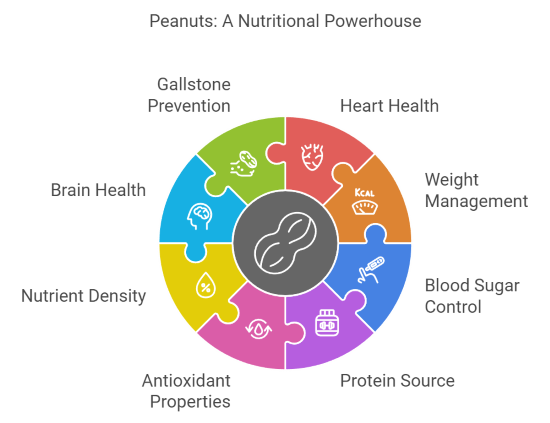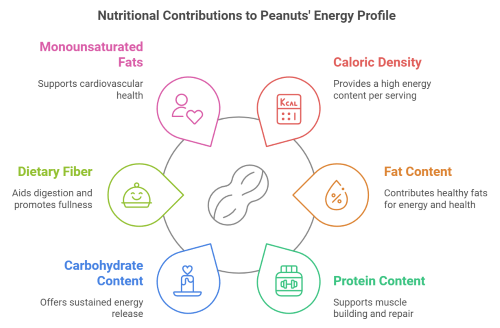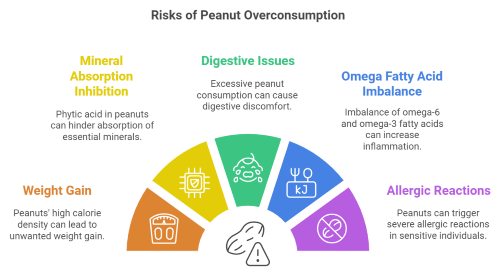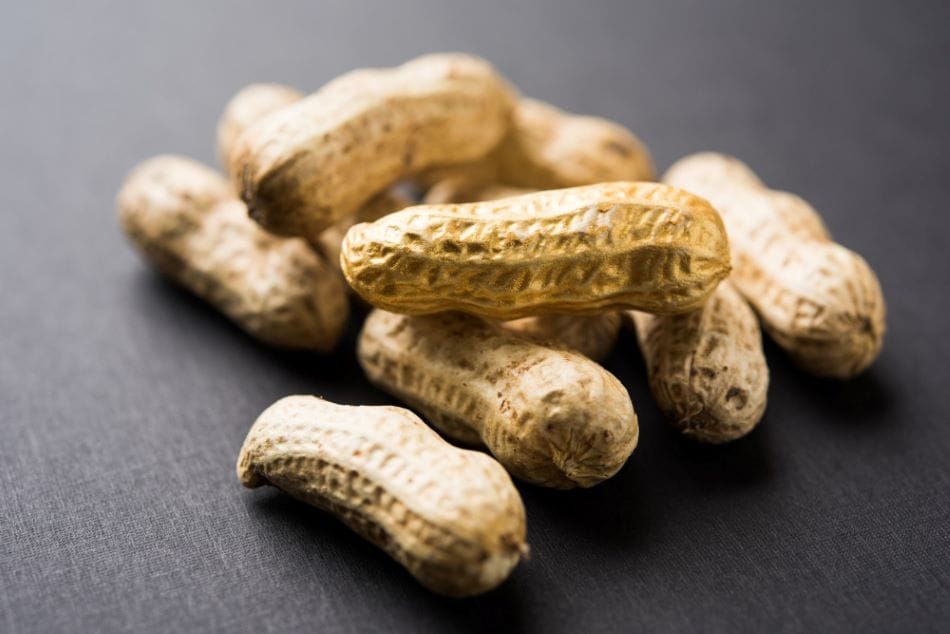Introduction
Peanuts, a popular snack and ingredient, come in various forms, including raw, roasted, and salted varieties, each with distinct nutritional profiles and health implications. While all types offer protein, healthy fats, and essential nutrients, the processing methods can affect their overall nutritional value and impact on health.
Affiliate Disclaimer
This blog post may include links to affiliate sites. If you click on an affiliate link and make a purchase, we may earn a small commission or receive other compensation at no extra cost to you. Please note that many of the links on our site are affiliate links. Our use of these links does not impact the products, services, or websites we recommend to you. This disclaimer covers all forms of communication with you, including our website, email, phone, social media, products, and other platforms.
Amazon Affiliate Disclaimer
We participate in the Amazon Services LLC Associates Program, an affiliate marketing program that allows us to earn fees by linking to Amazon.com and its affiliated sites. If you click on an Amazon affiliate link on our site and make a purchase, we may receive a small commission at no additional cost to you.
Top 10 Peanut Benefits
Here are the top 10 health advantages of peanuts:
- Heart health: Rich in monounsaturated and polyunsaturated fats, peanuts help lower bad cholesterol levels and reduce the risk of cardiovascular disease.
- Weight management: Despite being calorie-dense, peanuts promote feelings of fullness and are associated with lower body mass index (BMI).
- Blood sugar control: With a low glycemic index, peanuts help regulate blood sugar levels, making them beneficial for people with or at risk of diabetes.
- Protein source: Peanuts provide high-quality plant-based protein, containing all 20 amino acids and being particularly rich in arginine.
- Antioxidant properties: Peanuts contain various antioxidants like resveratrol, phenolic acids, and flavonoids, which help combat oxidative stress.
- Nutrient density: They are packed with essential vitamins and minerals, including niacin, folate, vitamin E, magnesium, and phosphorus.
- Brain health: The niacin content in peanuts may help protect against cognitive decline and Alzheimer's disease.
- Gallstone prevention: Regular peanut consumption is associated with a reduced risk of gallbladder stone formation.
- Anti-inflammatory effects: Compounds in peanuts have been shown to lower levels of inflammatory markers in the body.
- Longevity promotion: The combination of nutrients and bioactive compounds in peanuts is thought to contribute to increased lifespan when consumed as part of a balanced diet.

Peanut Energy Parameters
Here are 10 main energetic parameters of peanuts:
- Caloric density: Peanuts provide approximately 567 calories per 100 grams, making them a high-energy food source.
- Total fat content: Peanuts contain about 49.24 grams of fat per 100 grams, contributing significantly to their energy value.
- Protein content: With 25.8 grams of protein per 100 grams, peanuts offer substantial energy for muscle building and repair.
- Carbohydrate content: Peanuts contain 16.13 grams of carbohydrates per 100 grams, providing a moderate source of energy.
- Dietary fiber: Peanuts offer 8.5 grams of fiber per 100 grams, which aids in digestion and provides a feeling of fullness.
- Monounsaturated fats: Peanuts are rich in heart-healthy monounsaturated fats, which contribute to their energy profile and health benefits.
- Polyunsaturated fats: These essential fats in peanuts provide energy and support various bodily functions.
- Sugar content: Peanuts contain about 4.72 grams of sugar per 100 grams, contributing to their overall energy content.
- Glycemic index: Peanuts have a low glycemic index of 14, indicating a slow and steady release of energy.
- Metabolizable energy: The energy available for metabolism from peanuts is high, making them an efficient fuel source for the body.
This combination of macronutrients and energy parameters makes peanuts a nutrient-dense, high-energy food suitable for various dietary needs and active lifestyles.

Recommended Peanut Intake
The ideal daily dosage of peanuts is generally considered to be around 1-2 ounces (28-56 grams), which is equivalent to a small handful or about 30-60 peanuts12. This amount provides significant health benefits without excessive calorie intake. On a weekly basis, consuming peanuts 5-7 times per week is associated with optimal health outcomes.
Key points about peanut consumption:
- A serving of 1.5 ounces (42 grams) of most nuts, including peanuts, may reduce the risk of heart disease when part of a diet low in saturated fat and cholesterol.
- For weight management, 1-2 tablespoons of peanut butter or a small handful of peanuts daily can help control appetite without leading to weight gain.
- The recommended limit is around 42 grams per day, which is about 16 peanuts.
- Regular consumption of this amount has been linked to reduced risk of various diseases, including a 12% reduction in premature death risk.
It's important to note that while peanuts are nutrient-dense, they are also calorie-dense. Therefore, moderation is key, especially for those watching their calorie intake. Unsalted or lightly salted varieties are preferable to minimize sodium intake6. As with any dietary change, it's advisable to consult with a healthcare professional or registered dietitian for personalized advice.
Peanut Overconsumption Risks
While peanuts offer numerous health benefits, consuming them in excessive amounts can lead to several negative consequences:
- Weight gain: Peanuts are calorie-dense, with about 170 calories per ounce. Overconsumption can contribute to unwanted weight gain, potentially leading to obesity and related health issues.
- Mineral absorption inhibition: Peanuts contain phytic acid, which can interfere with the absorption of important minerals like iron, zinc, calcium, and manganese. Excessive intake may lead to mineral deficiencies over time.
- Digestive issues: Consuming large quantities of peanuts can cause digestive discomfort, including bloating, gas, and constipation due to their high fiber and fat content.
- Omega fatty acid imbalance: Peanuts are rich in omega-6 fatty acids but lack omega-3s. An imbalanced intake can potentially increase inflammation in the body.
- Allergic reactions: For those with peanut allergies, even small amounts can trigger severe reactions, ranging from mild symptoms to life-threatening anaphylaxis.
- Increased sodium intake: Salted peanuts can contribute to excessive sodium consumption, potentially leading to high blood pressure and an increased risk of heart disease.
- Aflatoxin exposure: Peanuts can sometimes be contaminated with aflatoxins, which are harmful compounds produced by certain molds. Long-term exposure to high levels of aflatoxins may increase the risk of liver damage and cancer.
To avoid these negative effects, it's crucial to consume peanuts in moderation as part of a balanced diet, typically limiting intake to about 1-2 ounces per day.

Nutrient Retention in Raw Peanuts
Raw peanuts retain higher levels of certain nutrients compared to their roasted counterparts. They contain more fiber, with approximately 8.5 grams per 100-gram serving1. Raw peanuts also preserve higher amounts of antioxidants and vitamin E, which are beneficial for overall health. The natural enzyme content in raw peanuts remains intact, potentially aiding in digestion.
Key nutrients retained in raw peanuts include:
- Folate: 240 μg per 100g, meeting 60% of the recommended daily allowance
- Thiamin: 0.640 mg per 100g, providing 53% of the recommended daily allowance
- Magnesium: 160 mg per 100g, contributing to 42% of daily needs
- Phosphorus: Meeting 54% of daily requirements
While raw peanuts offer these nutritional advantages, it's important to note that they may contain antinutrients like phytic acid, which can slightly reduce the bioavailability of certain minerals. Overall, raw peanuts provide a nutrient-dense option for those seeking to maximize their intake of specific vitamins and minerals.

Sodium Levels in Salted Peanuts
Salted peanuts, often perceived as high in sodium, actually contain less sodium than many other common snack foods. A typical serving of roasted salted peanuts contains about 119 mg of sodium per ounce, which qualifies them as a low-sodium food according to the FDA's standards. This is significantly lower than many breads or breakfast cereals, which often have higher sodium content per serving. Interestingly, the salt on peanuts is mostly on the surface, leading to a more intense flavor perception without a corresponding increase in sodium intake.
Comparatively, lightly salted dry-roasted peanuts have even less sodium, with about 75 mg per serving. This makes them a heart-friendly option for those watching their sodium intake. Despite these relatively low levels, it's still advisable to be mindful of portion sizes to avoid excessive sodium consumption, especially since dietary guidelines recommend keeping daily sodium intake under 2,000 mg to prevent chronic diseases like hypertension.
Antioxidant Loss During Roasting
Roasting peanuts can lead to changes in their antioxidant content, with both losses and gains depending on the specific compounds and conditions. During roasting, some antioxidants, such as vitamin E, may degrade due to exposure to high temperatures. For instance, studies have shown that roasting almonds and walnuts at higher temperatures result in significant losses of alpha-tocopherol, a form of vitamin E. However, not all antioxidants are negatively affected; certain compounds like lutein and zeaxanthin in pistachios and hazelnuts remain stable during roasting.
Interestingly, roasting can also enhance the antioxidant properties of peanuts. The process can increase the release of phenolic compounds, which contribute to antioxidant activity. For example, roasted peanut skins have been found to exhibit higher radical scavenging capacities compared to their raw counterparts. This suggests that while some antioxidants are lost during roasting, others may be enhanced or newly formed, potentially offering different health benefits.
Nut Nutritional Comparison
When comparing peanuts to other nuts, several key differences emerge:
- Protein content: Peanuts contain more protein than most tree nuts, with approximately 7g per ounce compared to 6g in almonds and 4g in walnuts.
- Fat profile: While peanuts are rich in monounsaturated fats, they have a higher ratio of omega-6 to omega-3 fatty acids compared to walnuts, which are known for their beneficial omega-3 content.
- Antioxidants: Peanuts contain resveratrol, an antioxidant also found in red wine, which is not present in most other nuts. However, walnuts and pecans generally have higher overall antioxidant content.
- Mineral content: Almonds outperform peanuts in calcium and magnesium content, while Brazil nuts are superior sources of selenium.
- Affordability: Peanuts are generally less expensive than tree nuts, making them a more accessible source of nutrients for many consumers.
- Allergies: Peanut allergies are more common and often more severe than allergies to tree nuts, though cross-reactivity can occur.
While each nut offers unique nutritional benefits, peanuts stand out for their high protein content and affordability, making them a valuable addition to a balanced diet alongside a variety of other nuts.
Peanuts Benefits Summary
Peanuts offer a wealth of health benefits when consumed in moderation as part of a balanced diet. Rich in protein, healthy fats, vitamins, and minerals, peanuts can support heart health, aid in weight management, and help regulate blood sugar levels. The recommended daily intake is about 1-2 ounces (28-56 grams), equivalent to a small handful of peanuts.
While raw peanuts retain higher levels of certain nutrients, roasted peanuts can still provide significant health benefits. Salted varieties, contrary to popular belief, contain relatively low sodium levels compared to many other snack foods. However, it's important to be mindful of potential risks associated with overconsumption, such as weight gain, mineral absorption inhibition, and digestive issues.
Overall, peanuts are a versatile and nutritious food that can contribute positively to overall health when consumed responsibly. Their nutrient density, antioxidant properties, and potential to promote longevity make them a valuable addition to most diets. As with any dietary change, it's advisable to consult with a healthcare professional for personalized advice on incorporating peanuts into your diet.
Peanuts FAQs
Here are the top 10 frequently asked questions about peanuts with short answers:
- Are peanuts actually nuts?
- No, peanuts are legumes, not true nuts. They grow underground, unlike tree nuts.
- How many peanuts should I eat per day?
- The recommended daily intake is about 1-2 ounces (28-56 grams), or roughly a small handful.
- Are raw or roasted peanuts healthier?
- Raw peanuts retain more nutrients, but roasted peanuts are still nutritious and may have enhanced antioxidant properties.
- Can peanuts help with weight loss?
- Yes, despite being calorie-dense, peanuts can aid weight management by promoting feelings of fullness.
- Are salted peanuts bad for you?
- Salted peanuts contain less sodium than many other snack foods and can be part of a healthy diet when consumed in moderation.
- Do peanuts affect blood sugar?
- Peanuts have a low glycemic index and can help regulate blood sugar levels, making them suitable for people with diabetes.
- What are the main health benefits of peanuts?
- Key benefits include heart health support, weight management, blood sugar control, and providing essential nutrients and antioxidants.
- Can eating peanuts reduce the risk of heart disease?
- Yes, regular peanut consumption is associated with a reduced risk of cardiovascular disease due to their healthy fat content.
- Are peanuts a good source of protein?
- Yes, peanuts are an excellent plant-based protein source, containing all 20 amino acids.
- Can eating too many peanuts be harmful?
- Yes, overconsumption can lead to weight gain, digestive issues, and potential mineral absorption inhibition.


